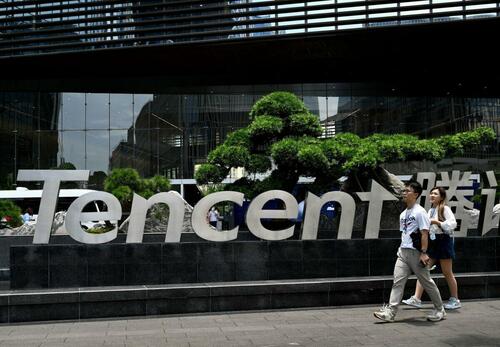Risks Accumulate For China Investors, Including Harvard
Authored by Anders Corr via The Epoch Times,
Risk is accumulating for China investors, with private equity in particular trouble. Harvard University, one of the world’s top PE investors, with an endowment of $53.2 billion, recently showed a crack in its veneer on China.
“In a sign of a potential pullback,” according to Bloomberg News, “Harvard University’s endowment is considering tapering its investments in China.” Bloomberg sources, familiar with Harvard’s investment strategy, asked to remain anonymous.
Publicly, however, 34 percent of Harvard’s endowment in 2021 was in private equity, up from 23 percent in 2020. Harvard declined to tell Bloomberg what percent of its PE investments are in China.
Surveys cited by Bloomberg show that investors beyond Harvard are also getting nervous about China.
In the first half of 2021, according to Bain & Co., only 35 percent of China investment managers viewed the country’s outlook with confidence. Compare that to 60 percent who were confident on Asia more generally.
According to Preqin, a financial data analysis company, about half of alternative investors late last year saw Southeast Asia as the best emerging market opportunity, a 37 percent increase from the year prior.
Political Risk to Private Equity in China
PE invests in companies that are private, for example, that have not gone public through exchanges in financial centers like New York, Hong Kong, and Shanghai. Because PE lacks a mass base of owners, it is in some ways more vulnerable to political risk, especially in China. If the value of companies held by PE firms decreases substantially due to some action by Beijing, there are fewer investors to complain.
Complaining is even more difficult in China, where power is centralized by Xi Jinping and his Standing Committee of just seven top Chinese Communist Party (CCP) Politburo members. The ideology of the CCP has historically been anti-capitalist, which is ultimately against private equity.
Xi, more than past Chinese leaders like Deng Xiaoping, looks backwards with nostalgia to the days of Maoism and state control of the economy.
PE investors in Chinese equities started to realize how vulnerable they were last year when Chinese regulators clamped down on broad sectors of the economy, including technology, ride-sharing, online education, and gaming.
Using the term “common prosperity,” the CCP took aim at the most profitable companies, disappeared some Chinese businessmen, and strong-armed others into massive donations that they would not otherwise have made.
Beijing Sinks Online Education
For example, in 2020, PE-backed investment in Chinese education companies reached $8.1 billion. As pandemic lockdowns denied children the classroom and sent them to their computers instead, online education companies seemed like a good billion-dollar bet. Valuations of some of them doubled within a year.
One such company was Yuanfudao, backed by $3.5 billion from PE investors, including Tencent Holdings, Jack Ma’s Yunfeng Capital, Hillhouse Capital Group, Singapore’s sovereign wealth fund, and Temasek.
But last summer, in the context of citizen complaints about education being too expensive for Chinese families, and according to the CCP, leading to low birth rates, Beijing took an extraordinary step.
It moved to ban profits among private tutoring companies that teach core school subjects. That any government would ban profits is almost unimaginable for a PE investor or anyone else.
The new rules converted the companies into nonprofit organizations and banned any further domestic or international investment. While enforcement details were hazy, the regulations came as a shock to PE firms that had already invested billions on the assumption that profits were still allowed. The ban risked killing many companies and making a profitable exit through going public, next to impossible.
The debilitating non-market result should have been predicted by Beijing’s regulators. Banning profits should cause investment in the private education sector to decrease. There will be fewer opportunities for children to learn in what has become an ongoing pandemic.
Some of the world’s worst lockdowns and travel restrictions are still on in China, including in Shanghai and Hong Kong, previously some of the freest places in China.
The response of parents to children at home without good online learning might reasonably be to have fewer children or emigrate away from China, both outcomes that put downward pressure on China’s population growth—the opposite of what Beijing intended.
Multivalent Accumulation of Risk to Investment in China
The cavalier and self-destructive attitude of CCP regulators to market principles is rightly giving institutional investors second thoughts about their billion-dollar investments in a totalitarian communist country that they previously liked to imagine was on its way to democracy and open markets. Investors drank their own Kool-Aid and now are paying the price.
The biggest American institutional investors are even growing skeptical about investing in specialist Chinese private equity funds. These funds, run by investors with white shoe pedigrees from banks like Goldman Sachs, are struggling to meet deadlines and hit their billion-dollar targets to attract new cash.
Pension funds and endowments are turning away from such China funds, not only due to political and market risks but because of building debt in the economy, COVID-19 restrictions, and the resulting downgrade in earnings expectations.
Xi’s regulation crackdown has hit China’s tech giants, including Tencent and Alibaba, even as the United States is barring production in Xinjiang due to the Uyghur genocide.
American regulators are threatening to delist hundreds of Chinese firms listed on U.S. exchanges for failure to provide transparent audits to the U.S. Securities and Exchange Commission. In many instances, Chinese law does not allow such disclosures, putting the companies in an impossible situation of needing to choose which law to violate.
With Russia’s war in Ukraine, apparently supported by the CCP, the risks of secondary U.S. sanctions against China for the war in Ukraine cannot be ignored.
Over the last 12 months, a Pennsylvania state employees pension fund stopped committing new cash to China’s PE funds altogether. It currently has approximately 2 percent exposure to Chinese assets. Florida’s pension system of $253 billion in assets, less than 3 percent of which was in China as of January, has also turned the cash spigot off for new investment in China.
In the first quarter of 2022, U.S. dollar funds invested in China dropped to $1.4 billion, the lowest number since 2018 for that period, according to Bloomberg. Quarter after quarter last year, this sector suffered declines.
Even as the money for China private equity dries up, according to Bain & Co. research, its managers continue to grow in number, reaching approximately 1,200 between 2019 and 2021, an increase of 25 percent over the prior period.
Every day, more China money managers chase less China money in the field.
That will not end well. Billions in private equity funds should be pulled from China and redeployed to countries that have a better track record on human rights, democracy, and the market principles that best assure future profits and real prosperity for all.
Views expressed in this article are the opinions of the author and do not necessarily reflect the views of The Epoch Times.
Tyler Durden
Fri, 04/22/2022 – 17:40
via ZeroHedge News https://ift.tt/REcBU2x Tyler Durden


